Related Research Articles

The politics of Bolivia takes place in a framework of a presidential representative democratic republic, whereby the president is head of state, head of government and head of a diverse multi-party system. Executive power is exercised by the government. Legislative power is vested in both the government and the two chambers of parliament. Both the Judiciary and the electoral branch are independent of the executive and the legislature. After the 2014 election, 53.1% of the seats in national parliament were held by women, a higher proportion of women than that of the population.
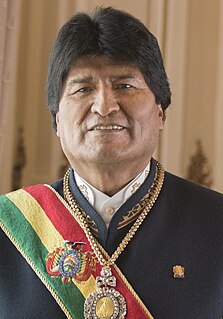
Juan Evo Morales Ayma is a Bolivian politician, trade union organizer, and former cocalero activist who served as the 65th President of Bolivia from 2006 to 2019. Widely regarded as the country's first president to come from its indigenous population, his administration focused on the implementation of leftist policies and combating the influence of the United States and multinational corporations. Ideologically a socialist, he has led the Movement for Socialism (MAS) party since 1998.
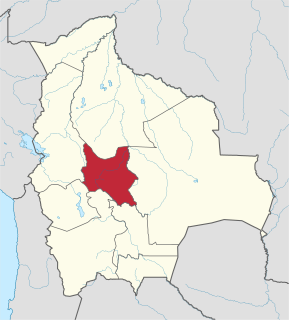
Cochabamba, from Quechua qucha or qhucha, meaning "lake", pampa meaning "plain", is one of the nine departments of Bolivia. It is known to be the "granary" of the country because of its variety of agricultural products from its geographical position. It has an area of 55,631 km2. Its population in the 2012 census was 1,758,143. Its capital is the city of Cochabamba, known as the "City of Eternal Spring" and "The Garden City" because of its spring-like temperatures all year.

Manfred Armando Antonio Reyes Villa Bacigalupi is a Bolivian politician, businessman, and former military officer. He was elected mayor of the city of Cochabamba five consecutive times, and became the elected Prefect of the Department of Cochabamba from 2006 until 2008 when he was recalled in that year's no confidence referendum.
The New Republican Force is a center-right political party in Bolivia. It is mainly based in the department of Cochabamba.

The Movement for Socialism–Political Instrument for the Sovereignty of the Peoples, alternately referred to as the Movement Towards Socialism or the Movement to Socialism, is a Bolivian left-wing populist and indigenist political party led by Evo Morales, founded in 1998. Its followers are known as Masistas.
Social unrest in Cochabamba involved violent clashes between supporters and opponents of Cochabamba Prefect Manfred Reyes Villa in the departmental capital city of Cochabamba, Bolivia, reaching their peak on January 11 and 12, 2007. The policies of the President Evo Morales and the agenda of his Movement towards Socialism (MAS) party in the Constituent Assembly were opposed by politicians in other political parties, notably Reyes Villa. The prefect's opposition to Morales' policies angered the President's supporters, and early in 2007 demonstrations in Cochabamba escalated into violent clashes between Reyes Villa's civic movement and urban and rural social movements who called for his ouster. During the violence, coca farmer Juan Tica Colque and the young student Christian Urresti (17) were killed. Coca farmer Luciano Colque (48) was mortally wounded by blows from civic movement protesters and died of cranial trauma on February 27. Some 200 people were wounded in the clashes.

General elections were held in Bolivia on December 6, 2009, following a constitutional referendum held on 25 January 2009. Voters elected:
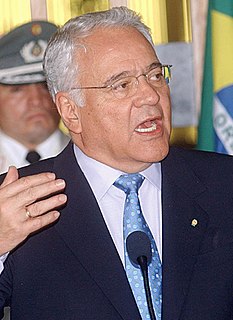
General elections were held in Bolivia on 30 June 2002. As no candidate for the presidency received over 50% of the vote, the National Congress was required to elect a President. Gonzalo Sánchez de Lozada was elected with 84 votes to the 43 received by Evo Morales.

The history of Bolivia since 1982 begins with the restorations of democracy after the rule of the military junta of 1982. Evo Morales held the presidency from 2006 to 2019. A new constitution was enacted in 2009. Bolivia's population has roughly doubled over this period, from 5 million in 1980 to 10 million as of 2012.
Román Loayza Caero is a Bolivian politician and farmer. He was a prominent leader in the farmers' trade union movement and one of the founders of the Movement for Socialism (MAS).
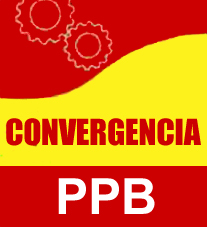
Plan Progress for Bolivia – National Convergence was a coalition that was Bolivia's largest national opposition political party following the 2009 general elections. PPB-CN is a Bolivian political alliance of the right-wing formed in advance of the 2009 elections. The alliance was created at a meeting in La Paz's Zona Sur on 4 September 2009 by New Republican Force represented by Manfred Reyes Villa, Plan Progress for Bolivia, represented by José Luis Paredes, the former prefect of La Paz department; Autonomy for Bolivia led by Luis Alberto Serrate Middagh; Peoples Party led by Pablo Nicolás Camacho Bedregal; and the Nationalist Revolutionary Movement, led by Guillermo Bedregal Gutiérrez. However, the alliance did not continue to function in Bolivia's 2014 elections, and several of its elected senators stated in late 2013 that its role is ending.

Municipal elections were held in Bolivia, on December 5, 1999, in all 311 municipalities across the country. The elections marked a milestone in the continuous deterioration of the political influence of the traditional parties. In 23 municipalities the mayors were elected through direct popular vote, in other municipalities the mayors were elected by the respective municipal council.

The Presidency of Evo Morales began on January 22, 2006 when Evo Morales was inaugurated as the 80th President of Bolivia, following his victory in the 2005 general election, where he won 53.7% of the vote, defeating Jorge Quiroga, Samuel Doria Medina, and several other candidates. Morales increased taxation on the hydrocarbon industry to bolster social spending, emphasising projects to combat illiteracy, poverty, racism, and sexism. Vocally criticizing neoliberalism and reducing Bolivia's dependence on the World Bank and International Monetary Fund, his administration oversaw strong economic growth while following a policy termed "Evonomics" which sought to move from a liberal economic approach to a mixed economy. Scaling back U.S. influence in the country, he built relationships with leftist governments in the Latin American pink tide and signed Bolivia into the Bolivarian Alliance for the Americas. Attempting to moderate the left-indigenous activist community, his administration also opposed the right-wing autonomist demands of Bolivia's eastern provinces. Winning a recall referendum in 2008, he instituted a new constitution that established Bolivia as a plurinational state and was re-elected in 2009. His second term witnessed the continuation of leftist policies and Bolivia's joining of the Bank of the South and Community of Latin American and Caribbean States; he was again reelected in the 2014 general election. Following the disputed 2019 general election and the ensuing unrest, Morales resigned and flew to Mexico where he had been granted political asylum.
The Assembly for the Sovereignty of the Peoples was a political organization in Bolivia. It was formed as a "political instrument" of the popular movements of the country. Alejo Véliz was the national president of ASP.

The United Left was a political coalition in Bolivia. IU was launched ahead of the 1989 national elections, as a successor of the United People's Front (FPU). At the time of its founding IU consisted of eight parties, including the Revolutionary Left Movement - Free Bolivia (MIR-BL), the Communist Party of Bolivia (PCB), the Socialist Party-1 (PS-1), the Axis of Patriotic Convergence (ECP), the Movement for Socialist-Unzaguist (MAS-U) and FOM.

General elections were held in Bolivia on 12 October 2014, the second to take place under the country's 2009 constitution, and the first supervised by the Plurinational Electoral Organ, a newly created fourth branch of government. Incumbent President Evo Morales was re-elected for a third term.

The Social Democratic Movement, often shortened to just the Democrats, is a centre-right political party in Bolivia founded in 2013 for the movement for greater autonomy for the eastern departments of the Media Luna.
Ana María Flores Sanzetenea is a Bolivian engineer, businesswoman, ex-senator, and politician. She is also known for her candidacy for the presidency of Bolivia in the 2009 general election, in which she finished fifth.
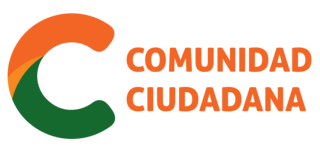
Civic Community is a centrist Bolivian political coalition led by former president Carlos Mesa, founded in 2018 to contest the 2019 general election. It was born of the alliance of Revolutionary Left Front (FRI), Sovereignty and Freedom (Sol.Bo), All Organization, and Kochala Force parties. The alliance holds Mesa's presidential candidacy, with former minister Gustavo Pedraza as his running mate. The CC elected 50 deputies and 14 senators in the country's Plurinational Legislative Assembly in the election.
References
- ↑ "In Bolivia, flamboyant Morales confidante becomes foe", Bernd Debusmann, Reuters, UK, May 30, 2006.
- 1 2 3 "Ex-Morales backer decries party betrayal," Martin Arostegui, The Washington Times , June 13, 2006.
- ↑ (in Spanish) Fuerza Demócrata será el frente de Román Loayza y Adriana Gil, La Prensa (La Paz, Bolivia), May 8, 2009. Archived May 15, 2009, at the Wayback Machine
- ↑ (in Spanish) Adriana Gil sella alianza con Manfred y se aleja de Loayza, Eabolivia, June 25, 2009.